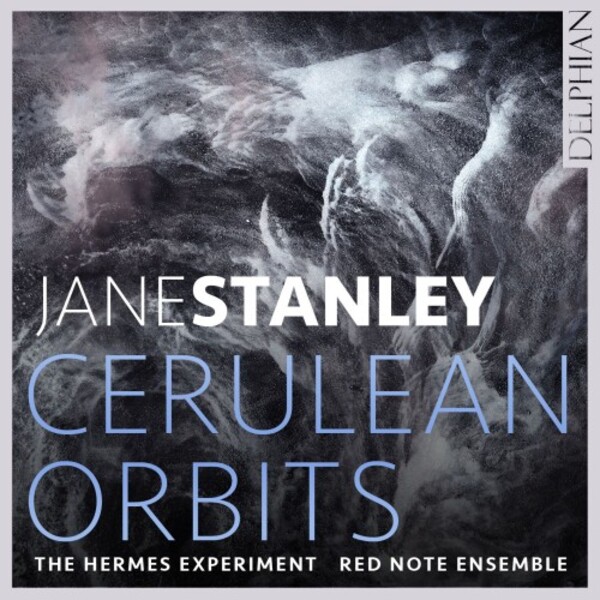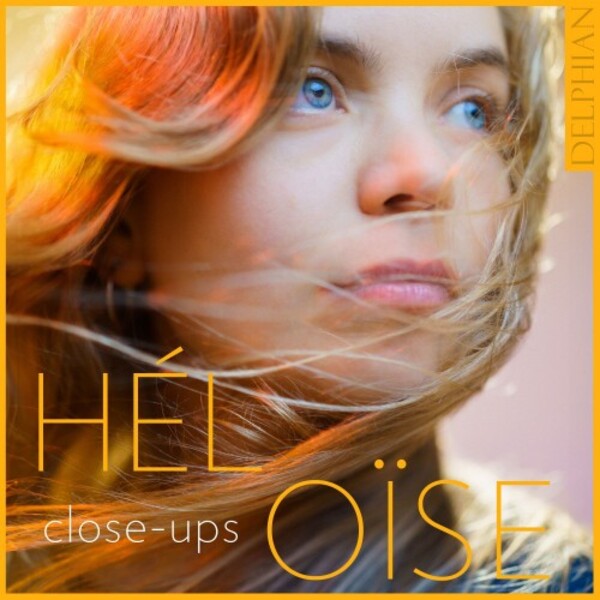Héloïse Werner: close-ups. J STANLEY Cerulean Orbits
View record and artist detailsRecord and Artist Details
Genre:
Vocal
Label: Delphian
Magazine Review Date: 08/2024
Media Format: CD or Download
Media Runtime: 70
Mastering:
DDD
Catalogue Number: DCD34281

Tracks:
| Composition | Artist Credit |
|---|---|
| Cerulean Orbits |
Jane Stanley, Composer
Red Note Ensemble |
| Helix Reflection |
Jane Stanley, Composer
Red Note Ensemble |
| The Indifferent |
Jane Stanley, Composer
The Hermes Experiment |
| Oneiroi |
Jane Stanley, Composer
Red Note Ensemble |
| Suite |
Jane Stanley, Composer
Red Note Ensemble |
Composer or Director: Héloïse Werner, Max Baillie
Genre:
Vocal
Label: Delphian
Magazine Review Date: 08/2024
Media Format: CD or Download
Media Runtime: 62
Mastering:
DDD
Catalogue Number: DCD34312

Tracks:
| Composition | Artist Credit |
|---|---|
| O vis eternitatis |
Abbess Hildegard of Bingen, Composer
Colin Alexander, Cello Héloïse Werner, Composer |
| Sombres lieux |
Julie Pinel, Composer
Colin Alexander, Cello Héloïse Werner, Composer Marianne Schofield, Double bass Max Baillie, Composer |
| Che si può fare? |
Barbara Strozzi, Composer
Colin Alexander, Cello Héloïse Werner, Composer Julian Azkoul, Violin Marianne Schofield, Double bass Max Baillie, Composer Ruth Gibson, Viola |
| Tree |
Errollyn Wallen, Composer
Colin Alexander, Cello Héloïse Werner, Composer Julian Azkoul, Violin Max Baillie, Composer Ruth Gibson, Viola |
| close-ups |
Héloïse Werner, Composer
Héloïse Werner, Composer Max Baillie, Composer |
| Les leçons du mardi |
Héloïse Werner, Composer
Colin Alexander, Cello Héloïse Werner, Composer Julian Azkoul, Violin Max Baillie, Composer Ruth Gibson, Viola |
| Lullaby for a sister |
Héloïse Werner, Composer
Colin Alexander, Cello Héloïse Werner, Composer |
| Unspecified Intentions |
Héloïse Werner, Composer
Colin Alexander, Cello Héloïse Werner, Composer Julian Azkoul, Violin Marianne Schofield, Double bass Max Baillie, Composer Ruth Gibson, Viola |
| Three Echoes |
Héloïse Werner, Composer
Colin Alexander, Cello Héloïse Werner, Composer Kit Downes, Cello Marianne Schofield, Double bass Max Baillie, Composer |
Author: Pwyll ap Siôn
Contrasts and continuities combine to create some fascinating and revealing results on two recent releases of vocal and instrumental music on the Delphian label. Listeners familiar with Héloïse Werner’s previous recordings with The Hermes Experiment – the ensemble she helped establish 10 years ago – and on the impressive debut solo album ‘Phrases’ (7/22) will know what to expect from the soprano, composer and sometime cellist: jaw-dropping technical agility combined with an innate, instinctive musicality and boundless, breathless creativity. The sheer range and diversity of Werner’s voice is on display once more on ‘close-ups’: restrained and bereft in Barbara Strozzi’s Che si può fare, enigmatic in Errollyn Wallen’s Tree, radiant in Hildegard of Bingen’s O vis eternitatis and quietly reflective in the singer’s own nostalgic Lullaby for a sister.
Time appears to stand still during these points, especially in Julie Pinel’s Sombres lieux, in a hauntingly beautiful arrangement made by Werner’s longtime musical collaborator and fellow performer, virtuoso double bassist Marianne Schofield. Nevertheless, one also hears moments of boundless, unrestrained energy, playfulness and an almost youthful exuberance, as encapsulated in the title-track – an engagingly dynamic duet between voice and violin exhibiting the kind of vocal gymnastics and pyrotechnics that wowed listeners on Werner’s first album.
Another Werner composition, Les leçons du mardi, takes as its starting point the so-called ‘hysteria shows’ hosted by neurologist Jean-Martin Charcot towards the end of the 19th century at the Salpêtrière hospital in Paris, where patients (many of them women) were put on display to act out their ‘illnesses’. Misogynistic texts ranging from fifth-century BC Hippocrates (‘the womb is the origin of all diseases’) to, incredibly, a 2021 WikiHow article on ‘How to Recognise the Potential Crazy Girlfriend’ are read out against a backdrop of busy string patterns, scurrying around animatedly, that teeter on the edge of their own musical disorder and instability. Sobering, amusing and deeply disturbing.
Despite its multifarious design, ‘close-ups’ nevertheless possesses a strong sense of its own creative vision and purpose beyond the surface identity of vocals-plus strings. At first glance, a distinctive compositional voice is perhaps less obviously noticeable on Jane Stanley’s debut portrait album, ‘Cerulean Orbits’. Featuring music for different chamber combinations composed between 2013 and 2023, the earliest works presented here, namely Helix Reflection for flute and clarinet and the eight-movement Suite for clarinet, violin, cello and piano (both played with poise and control by Red Note Ensemble), suggest the influence of Messiaen, in the bold unison passages of the Suite’s second movement and the quirky, capricious, dancelike fifth (subtitled ‘Mechanical Birds’). More resonant, floating passages point towards spectralism and Saariaho, while the hard-edged sonic veneer of Cerulean Orbits for violin and piano evokes the brittle harmonic language of Elliott Carter. John Fallas aptly describes Stanley in the booklet essay as a ‘creator of continuities and contrasts which combine to form a many-faceted portrait of meaningful coexistence’. The recent song-cycle The Indifferent, again featuring Werner’s impressive soprano voice, this time alongside The Hermes Experiment, is something of a departure. Drawing on texts by Australian poet Judith Bishop, Stanley’s reflecting shapes, mirroring lines and cycling harmonic patterns now operate within a more obviously tonal environment, especially during the folk-like first and last movements. It will be interesting to see what she produces next.
Discover the world's largest classical music catalogue with Presto Music.

Gramophone Digital Club
- Digital Edition
- Digital Archive
- Reviews Database
- Full website access
From £8.75 / month
Subscribe
Gramophone Full Club
- Print Edition
- Digital Edition
- Digital Archive
- Reviews Database
- Full website access
From £11.00 / month
Subscribe
If you are a library, university or other organisation that would be interested in an institutional subscription to Gramophone please click here for further information.




